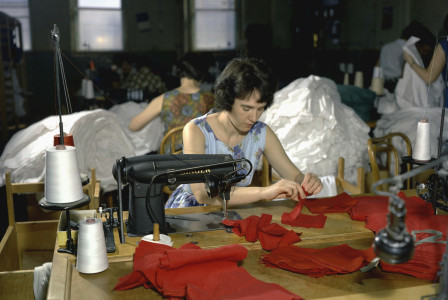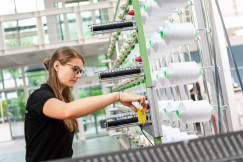Best practices
25 June 2025
Breaking the silence: how data is transforming gender equality in textile factories
Best practices
25 June 2025
Social dimension
Sustainable competitiveness
Regulation and public governance
+12 more
Login / create an account to be able to react
-
190

An innovative partnership is closing the gender data gap in textile manufacturing through innovative assessment tools and collaborative action. This initiative demonstrates how companies can measure and tackle discrimination against women workers to create safer and more equal workplaces.
Topics
Albania
Armenia
Austria
Belgium
Bosnia and Herzegovina
Bulgaria
Croatia
Cyprus
Czechia
Denmark
Estonia
EU-27
Finland
France
Georgia
Germany
Greece
Hungary
Iceland
Ireland
Italy
Kosovo
Latvia
Liechtenstein
Lithuania
Luxembourg
Malta
Moldova
Montenegro
Netherlands
North Macedonia
Norway
Poland
Portugal
Romania
Serbia
Slovakia
Slovenia
Spain
Sweden
Switzerland
Türkiye
Ukraine
Other
Academic / Research and VET Institutions
Business Support Organisation
Company with 250 or more employees
Cluster Organisations
Consumer Organisations
Cultural and Heritage Organisations
Destination Management & Marketing Organisations
EU Institutions
Financial Institutions and Investors
Industry Associations and Chambers of Commerce
International Organisations
Local Authorities
Media / Journalist Organisations
National authorities
Networks and Federations / Confederations
NGOs / Non-profits
Notified Bodies
Regional Authorities
SMEs (a company with less than 250 employees)
Social Economy Entity
Trade Unions
Other
-
Transition Pathway's building blocks
-
-
Social dimension
-
Sustainable competitiveness
-
Regulation and public governance
-
-
Industrial ecosystems
-
-
Textile
-
-
Textiles ecosystem areas
-
-
Fibres, yarns and fabrics
-
Apparel and clothing accessories
-
Household/interior textiles
-
Technical textiles
-
Leather and fur
-
Footwear
-
Research and Innovation
-
Technology and Machinery
-
Waste management, reuse and repair
-
Business support and Communication
-
Not area specific (interested in more than one of the above)
-
Share
A collaborative solution
In 2023, the Partnership for Sustainable Textiles launched the "Gender Data Gap Partnership Initiative". The project is being implemented as part of the Partnership for Sustainable Textiles and is funded by the German Federal Ministry for Economic Cooperation and Development (BMZ) and brings together German textile brand (Hess Natur-Textilien and Gerry Weber International), non-profit organisations (Hessnatur Foundation and FEMNET, Global Standard gGmbH) and development agency (GIZ). The partnership developed a practical assessment tool that can be scaled across countries and stakeholders to measure, manage, and improve gender equality in textile manufacturing.
Testing the approach in Tunisia
The initiative piloted its methodology in the two Tunisian production facilities (Denim Manufacture and Manufacturing International Company) using a comprehensive two-level assessment system:
- Level 1 collects basic workforce data and information about existing policies on gender-based violence, harassment, and non-discrimination.
- Level 2 involves detailed individual and group interviews with diverse workers, covering health and safety, recruitment, training, leadership opportunities, wages, social dialogue, and violence prevention.
The assessment requires specially trained female auditors who are external, neutral, and culturally competent, without language barriers. This approach ensures workers can speak openly about their experiences in a safe environment.
Breakthrough results
The assessment focuses on three critical areas:
- Occupational safety of pregnant women
- Promotion opportunities for women
- Psychological and physical violence in the workplace.
Based on these findings, the Partnership developed targeted measures to promote gender equality and sensitisation training to raise awareness of gender-specific challenges. Importantly, a capacity building guide and employee questionnaire are created to ensure workers have input in determining the most suitable measures for their specific workplace.
A scalable and transferable solution
The project has produced an Assessment and Action Guide that companies can use to create lasting positive improvements and enhance working conditions for women. The guide includes questionnaires, evaluation methods, and action planning tools, along with a recommended training program covering gender data gaps, women's rights, labour law, and non-violent communication.
Business cases demonstrate clear business benefits of addressing gender equality:
- Companies with high gender diversity are 25% more likely to be profitable (McKinsey,2020)
- Diverse teams increase creativity by 59.1% and improve problem-solving (ILO,2020)
- Inclusive working environments increase employee commitment and reduce turnover (Maurer & Qureshi, 2019).
The Gender Data Gap Initiative proves that measuring gender equality is not only possible but essential for creating safe, and healthy working environments for all workers in the textile industry. It provides a replicable model for textile companies across Europe and beyond to assess and improve gender equality in their supply chains, supporting broader EU objectives for social sustainability and human rights due diligence.
Comments (0)
See also
Welcome to the 'Certification and Communication’ Community workspace
- Categories
- Infrastructure Investments and funding R&I, techniques and technological solutions +26 more
Your summer reading list on textile and leather supply chains
- Categories
- Infrastructure Investments and funding R&I, techniques and technological solutions +16 more
Welcome to the Skills and Talent Community Workspace!
- Categories
- Infrastructure Investments and funding R&I, techniques and technological solutions +28 more




